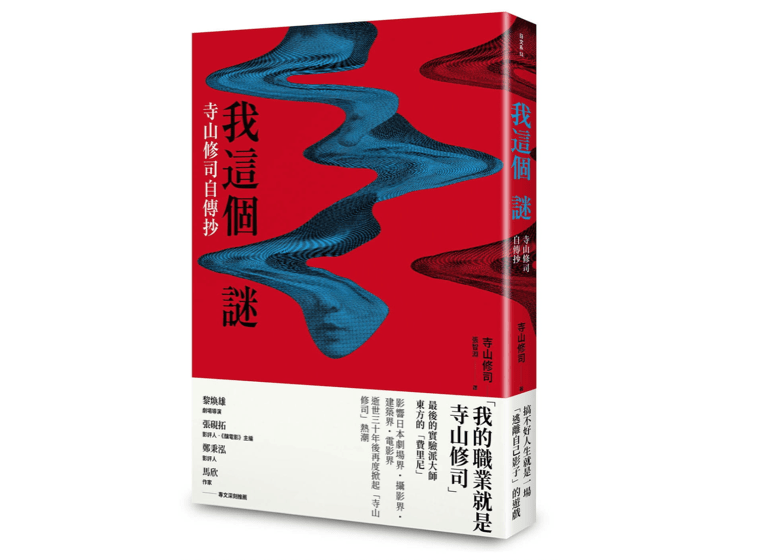
畢業於中正大學心理和哲學系,現就讀陽明交通大學社會與文化研究所。曾在關鍵評論網擔任書評專欄作者。文章主要投稿、刊登於 香港 微批paratext 或 虛詞.無形網站,多為文學、哲學類性質。另也有動漫評論發表於U-ACG。 信箱:f0921918962@gmail.com 信箱:f0921918962@gmail.com
Shuji Terayama's book review of "My Mystery": The truth does not exist in the past, but in the fiction of the "past"

"The so-called books are the false corpses of the present world, the corpses of the present world created by the people who wrote them... But if someone reads that sentence, the corpse will be resurrected. By deciphering the spell of words and reciting the spell of language, it belongs only to that An individual's present life will appear in the soul of the person who reads it in the form of a ghost, and it will indeed appear in front of the eyes. That... is a book." —— Jinggoku Natsuhiko, "Book Building Hanging Hall - Breaking Dawn"
Perhaps there is nothing in this world that is more suitable for discussing "what fiction is" than autobiography. Because the autobiography, like the book that Jinggoku Natsuhiko said—reading it is like seeing a corpse resurrected—let us see a dead author, a predecessor resurrected in fictional texts.
Shuji Terayama's "My Mystery" ostensibly seems to be about his upbringing, past, and experiences, but to the reader, this "autobiography" -- no matter how charming and real he is -- should not be taken as The author's real autobiography reading and research. Because what Shuji Terayama wants to discuss is not his own past, but the exact opposite: what exactly is an autobiography? How did the so-called "I" - this enigmatic thing - come into being?
"Fiction" is to hide oneself
To put it directly, My Mystery is a fiction that explores fiction (autobiography, memory). For Terayama Shuji, creation is not about expressing himself, as many artists advocate. On the contrary, he believes that creation is to hide.
"Whether in poetry, or in other writing, I hate 'confession' extremely. I don't think I write to 'show my inner truth', but to 'hide my inner truth'..."
Hiding doesn't mean hiding something, a bad thing you've done, but making what you want to happen—but that doesn't happen—in fiction as if it actually happened.
The process -- fiction -- is the same as remembering. According to many psychological studies, our memories of past events often do not correspond to what actually happened at the time, because the way humans store memories is not like a computer directly recording the content, but it will be re-written every time it is called. It is established once, so the content of each memory will change to varying degrees due to emotions and thoughts. Even for some reason, people will fabricate false memories and make themselves believe because that's what they want to happen.
"Memories are not necessarily what the author actually happened in the past, but what the author hopes actually happened in the past."
For Shuji Terayama, the past events in his "autobiography" are not entirely his actual past, but more of the past he wishes to happen. Just like the mirror mentioned from time to time in the book, the purpose of the mirror is not simply to reflect the actual self, he is more, like the queen in Snow White, wants to see in it, more than the actual self , but also more like "self". Therefore, the mirror does not simply reflect oneself, but reflects the desire of one's heart in it.
Therefore, Shuji Terayama said: "The mirror hides the temptation to fall." The same is true of fiction. They both make one want to explore the deep, invisible desires of the heart. Like violence, like sex.
scarcity as fictional desire
Creation and fiction reflect the insufficiency of the heart that cannot be satisfied. Judging from the book, Terayama Shuji's initial lack may have come from his alienation from his family. His father passed away early, his mother was unable to accompany him for financial reasons, and he witnessed the lingering scene of his mother cheating on the day his father left for the expedition. From then on, Shuji Terayama felt a deep sense of loss and hatred for "home" that he couldn't express.
"I persevered in the poem and killed my mother in my heart. But in reality, I only thought about running away."
He loves and hates his mother, because he finds that his mother is the only family member who takes care of him growing up, and in the process, in order to make a living, his mother has made a lot of sacrifices. However, he hated his mother's indifference to him growing up. Especially when the mother is old and old, she hopes that her son will accompany her lonely self at home, but her son is just at the time when he wants to work independently.
He had to obey his mother in a "twisted way". Although they live together, they often make excuses for coming home late. When I had to stay at home, I would only perfunctory my mother's words and just maintain some superficial etiquette.
"Indeed, the 'home' has lost its original function. The functions of education, entertainment, and protection are represented by society, while the functions of religion and gender are realized by the individual. The 'home' only has the function of caring for relatives, but he has become the most powerful The shackles. Wherever you go...you have to carry 'home' on your back."
I think what Shuji Terayama wrote was not just his own tragedy, but also the elegy of the entire era. As the society becomes more and more complex and huge, the pressure of life gradually overwhelms the support between people, and even endangers the function of the family. Too often, home is no longer a place of support, but a new source of anxiety and oppression.
There is no happy growth, lack of love, and cruelty in life, making people feel like a body full of holes, lifeless and empty. Only by recombining various "memory" of the past through creation and fiction can one's life be revived and the truth can be regained. Because the truth does not exist in the past, but in the fiction of the "past". And the reflections and new feelings obtained after the reconstruction.
death as life fiction
"I don't think death begins after life ends. I think death is nothing but a fiction created by the living, so when life ends, so does death... I clearly understand that 'death will come and go in a day' There is no life and death in this world, there is death and another kind of death. Death, I thought, might be hidden in all words."
The former said that death is a fiction, but the latter said that there is only death and another kind of death in the world. What exactly is life and death going back and forth like this?
For Terayama Shuji, death and death are different. Dying is the state of losing life. But the feeling of death is like a shadow of a man, occasionally suddenly found beside him. There are many things that make us feel dead, although they don't make us die. Or rather, life is not the opposite of death, but a process of death with different periods.
This kind of fiction is very important, as Heidegger said, people live to die and live to die. Without the feeling, imagination, and insight of death, people will not appreciate their own life. In other words, death is like another fictional self of oneself. Through the imagination of the state of death, the self in death becomes another mirror, illuminating oneself, staring at oneself, and even peeping at oneself.

Fiction as the mystery of "I"
"Even if I wanted to cut myself off from my shadow, he followed closely. Maybe life is a game of 'escape from my shadow'."
"Someone is peeping at himself who is peeping. This endless repetition leaves him in a state of half-hearted..."
Sometimes, creating seems like a peep into oneself. Because the fictional self is not a mere fantasy or imagination, but a gaze on the suppressed and unrepresented part of oneself in reality.
The endless repetition is fiction, and it is also a wandering memory. In this repetition, the two always stare at each other, and reorganize and dialogue through writing and memory, so that the repressed things are also reorganized. In the end, which of the characters in the book is "I" and which words are "I" My "true thoughts and emotions" were also difficult to distinguish... They became the origin of "My Mystery".
We always regard the past as a mirror, and try to project the vision of the future in it to find our own truth. But people often encounter the dilemma mentioned by Shuji Terayama: "The self that existed in the past; the self that exists now; the self that exists in the future; where is the real self?"
The real self, "I", does not exist. There is only the imagination of "I" in the future, and the reconstruction of "I" in the past. These are all fictions, but only in this constantly changing fiction can one discover and feel the reality of existence, because he can regain his lost past in the lost past and the overwhelmed future. A continuum of various encounters segmentation. It can even be said that fiction puts people into different times. There, past, present, and future echo each other, just like the plot of a novel. People pick up the fragmented time and connect the fragmented selves into a whole story.
The so-called "I" may never be an individual, right? He is just a story.
(The article will be published simultaneously on Medium and Fanggezi platforms)
Like my work?
Don't forget to support or like, so I know you are with me..
Comment…